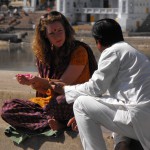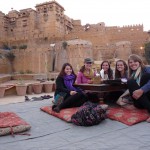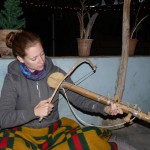People travel to India in search of themselves and seeking spiritual enlightenment from the yogis, gurus, sadhus, and Buddha. More and more often women are trying and “Eat, Pray, Love”’ approach to travel as they search for these things while travel to far off lands and India especially. In fact before I left for India, almost every one I told that I was moving here assumed I was searching for an “Eat, Pray, Love” experience. Wrong…
India is a land of rich culture and poverty, spicy food and lack of choices. I came to India in order to help people, and while I was able to do that to some degree, I am leaving an expert in many areas I had no idea I would even encounter. Some things are learned after a certain amount of time spent in India, others are oddly acquired skills or understandings that no one could have warned me about or taught me.
I would say one of the most useful things that I learned was the ability to bargain extremely hard. Being a foreigner living in India, it becomes easy to understand when someone is trying to rip you off and how much the Indian price should be. While sometimes the Indian price is unlikely, hard-core bargaining is the only way to get a fair price being white and foreign. This is where an unattainable skill for most comes into play: fighting back. I don’t know if it has anything to do with my already feisty attitude, but I cannot recount how many times I had to fight with a rickshaw driver, bus driver, or shop keeper who is trying to take advantage of me or my fellow white folk. This just needs to happen sometimes because when they know they can take advantage of the unsuspecting, it will continue to happen, and the fact that I knew how much I should be charged, they got an unwelcomed return to their sleaziness.
I would have to say, in life in general for me, another hugely important aspect to learning to live in India was food and drinking. Delhi Belly continues to be a major fear of travelers to India and while, yes, I have had my fair share of food related illnesses since arriving here, some important lessons and skills have also been learned. First and foremost, eating with one’s hands in India is an essential lesson and skill that must be learned in order to live with an Indian family and enjoy one’s experience to the fullest. This specific technique that can be found in any Indian home has affectionately been dubbed the “food claw” and generally uses three fingers and the thumb to pick up the food with the chapatti (whole wheat flatbread) and shovel it into the mouth. If eating rice, it is more acceptable and easy to use all fingers and pick up the bite of rice and vegetable and while balancing the bite all four fingertips, push the rice with a thumb in order to drop it in the mouth without placing lips on the fingers. Of course a few things that travelers are told not to do can be adapted to after a long period of time spent in India: eating uncooked vegetables, dining at the infamous street vendors, and drinking the local water. All these and more have been attempted and conquered by your truly, much to my dismay on earlier occasions of course. One other thing that cannot be forgotten when it comes to drinking or eating is that when you find a small insect or hair in your food, just pick it out and keep eating; it’s not the end of the world. And when you see someone washing the glass you just had juice or chai out of, what you don’t see doesn’t hurt, and in reality more often than not it is being washed this way whether you like it or not.
Food is not the last thing one must learn to cope with once arriving in India. Everyone has to face more pressing issues when the time arises. A new question for many more Westernized Indians continues to be: hand or toilet paper? This has not gone lost on any Westerner living in India and has been somewhere in a predicament that points to water and a hand since there is no toilet paper in the surrounding areas. I know it’s not pretty, but it’s a fact a life, and this is also why in India is inappropriate to use one’s left had anytime during a meal being that it is traditionally the hand one uses to clean oneself. Now that we are on the subject, another area that has to have some attention is bodily functions and getting used to talking about it with others around you. I mean, if you are sick in India, the doctor is not where you want to go but at a point, it may become necessary for others to know what it happening… It happens to everyone and should not be ashamed of at that point. Also, what someone who rides on public transportation or stand in close confines with the general public will notice is the likelihood of fingers digging in noses all around. This happens because in the desert it is dry and dusty and boogers just get stuck. There is only one way to do that and in public it is necessary and widely accepted to pick your nose.
Communication and timing has been a real problem for me being the typical straightforward, fast paced American. I had high hopes when coming here with plans to change the world, but I had forgotten how different cultures have differing understanding of time and efficiency. At a point, I realized that there was not much point in planning for something to happen at a particular time in a particular way because it won’t happen that way you want it to, so instead, a round about plan is best. After all, something I learned here that is a common sentiment is that “time is not of the essence, there is always tomorrow.” So when something like this happens, not just in India but most of the developing world, do not stress yourself out, it just won’t help. Communication is key in getting things done… But what happens when you can’t even communicate? You go with the flow and become a master at non-verbals and learn the important words to get you by, just like I did.
After all this time in India, and the strange and outlandish things I have learned about and to do, something else has emerged within me: a deep appreciation for the Western world. Being from a Westernized country, I have grown used to having choices in any avenue I feel compelled to desire. This is not the case in India and most non-industrialized Western countries. While, yes, Delhi and Mumbai and a few other cities are rapidly growing to expand their markets in more niche areas, I have not been subject to those niceties and have had to do with what ever is available. That goes for food, shopping, entertainment and more. This just makes me appreciate America and the availability of grocery stores especially but also clean toilets, commonly spoken English, and the availability of anything’s that your little heart desires.
I had thought I would look for a job in another country after this, but I am going to see how I feel once I am home and figure out if I would still like to be abroad for a job or start my career at home in America. These are now the things that will occupy my time once I arrive to the good ole U. S. of A.



